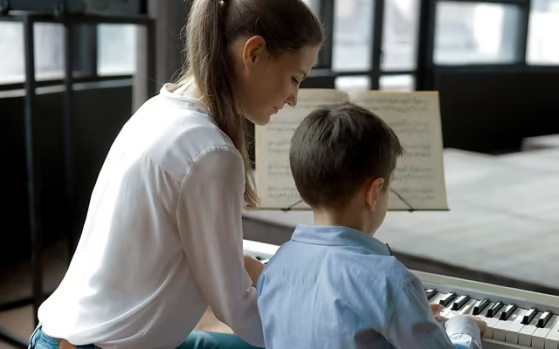As a Parent, How Can I Help My Child Make the Most of Music?
Music has the power to transform a child’s life, fostering creativity, discipline, and emotional growth. As a parent, your role in supporting your child’s music learning is truly invaluable. From encouraging regular practice to celebrating their achievements, your involvement can significantly enhance their overall experience. Furthermore, by actively participating in their journey, you can help create an environment where they not only develop their skills but also nurture their passion for music. In this way, your support becomes a key factor in making their learning experience more fulfilling and enjoyable. Here’s a comprehensive guide to help you support child’s music learning and ensure they get the most out of their music classes.

Create a Supportive Environment at Home
A conducive environment at home sets the foundation for effective learning. You don’t need a professional studio—simple steps can make a big difference:
- Designate a Practice Area: Create a quiet, distraction-free space where your child can focus on their practice.
- Maintain the Right Equipment: Ensure their instrument is well-maintained and ready to use. Accessories like a metronome, sheet music, or a tuner should be easily accessible.
- Establish a Routine: Encourage consistent practice by setting a daily schedule. A structured routine reinforces discipline and helps your child make steady progress.

Encourage Consistent Practice
Regular practice is crucial for mastering any musical skill. As a parent, you can help your child develop the discipline to practice effectively:
- Set Realistic Goals: Encourage your child to focus on small, achievable milestones rather than overwhelming them with big expectations.
- Break Down Practice Sessions: Shorter, focused sessions are more productive than long, aimless ones. Encourage them to work on specific aspects like scales, chords, or a challenging piece.
- Balance Practice and Rest: Avoid over-scheduling or forcing long practice hours. Allow breaks to keep their interest alive and prevent burnout.

Stay Engaged with Their Progress
Your active interest in supporting your child’s music learning can greatly motivate them to stay committed and enthusiastic. Here’s how you can show your involvement:
- Attend Recitals: First and foremost, make it a point to attend their performances, whether they’re at school, local events, or formal recitals. Your presence not only boosts their confidence but also shows them that their hard work is valued and appreciated.
- Ask Questions About Their Lessons: Furthermore, engage in conversations about their classes by asking questions like, “What piece are you working on this week?” or “What’s the most fun thing you’ve learned recently?” This curiosity keeps the dialogue going and encourages them to reflect on their progress.
- Communicate with the Teacher: Additionally, stay connected with their music instructor. Regular updates from the teacher can provide valuable insights into their strengths, areas for improvement, and how you can better support your child’s music learning at home. By working together with their teacher, you ensure a more cohesive and supportive learning experience.

Promote a Growth Mindset
Learning music is a process filled with ups and downs. Help your child embrace challenges and setbacks as opportunities to grow:
- Celebrate Effort, Not Just Results: Acknowledge their hard work, even if they don’t achieve perfection. This builds resilience and a love for learning.
- Encourage Problem-Solving: Guide them to analyze and address difficulties in their practice rather than giving up.
- Teach Patience: Progress can be slow at times. Remind your child that perseverance is key to improvement.

Cultivate Their Interest in Music Beyond Classes
Fostering a love for music outside of lessons can inspire your child and deepen their connection to their craft. To effectively support your child’s music learning, consider the following approaches:
Attend Live Performances: For instance, exposing your child to concerts or musical events can help them experience the joy and energy of live music. This not only provides inspiration but also motivates them to practice and pursue their own musical development.
Introduce Diverse Genres: Additionally, by introducing them to different musical styles, you broaden their musical horizons. From classical to jazz, pop, or world music, exploring various genres encourages creative thinking and helps them appreciate the richness and diversity of music.
Explore Music Apps and Tools: Moreover, encouraging the use of interactive apps or software can make learning fun and engaging. These tools offer an enjoyable way for your child to practice and reinforce their lessons, keeping them excited and involved in their musical growth.
Incorporating these strategies into your child’s music journey will not only support their learning but also help nurture a lifelong passion for music.

Provide Emotional and Mental Support
Music learning can be challenging at times, and your emotional support can make all the difference:
- Be Encouraging During Tough Times: Offer reassurance when your child faces difficulties, and remind them that setbacks are part of the learning process.
- Foster a Positive Attitude: Help them view practice as an enjoyable activity rather than a chore.
- Respect Their Independence: As they grow, give them the space to take ownership of their musical journey.

Help Them Record Performances
Recording performances is a valuable way to track progress and boost your child’s confidence:
- Set Up Recording Tools: Use simple devices like a smartphone or tablet to capture their practice sessions or recitals.
- Encourage Self-Reflection: Watching or listening to their recordings can help your child identify areas for improvement while celebrating their progress.
- Share Their Achievements: With their permission, share recordings with family or friends to provide encouragement and recognition.
- Track Growth Over Time: Compare recordings to show them how far they’ve come, motivating them to keep improving.

Sing Along or Support Them During Practice
Your active participation in their practice sessions can make music learning a bonding experience:
- Sing Along with Them: If your child is learning songs, join in by singing along or playing a simple accompaniment. Your involvement can make practice sessions more enjoyable.
- Play a Supporting Role: If you play an instrument, accompany your child during practice. Even clapping along or keeping time can enhance their learning experience.
- Be Present: Simply sitting nearby while they practice can make them feel supported and motivated to do their best.

Celebrate Their Achievements
Recognizing milestones and accomplishments, big or small, can build your child’s confidence and enthusiasm:
- Create a Reward System: Use small incentives to motivate them, like stickers, extra screen time, or a special treat for meeting practice goals.
- Host Family Performances: Invite friends and family to watch your child perform at home. This informal setting helps them gain confidence and feel appreciated.
- Highlight Their Progress: Regularly acknowledge how much they’ve improved, whether through recordings or by revisiting earlier pieces they’ve mastered.

Support Their Passion and Enjoy the Journey
At its heart, music should be a source of joy and fulfillment. Your role is not just to guide but also to share in their passion:
- Encourage Creativity: Let your child experiment with improvisation, composing, or exploring their unique musical style.
- Enjoy Music Together: Spend time listening to their favorite songs or exploring new ones together. If possible, learn an instrument yourself and make it a shared activity.
- Foster Lifelong Love for Music: Remind your child that music is more than a skill—it’s a lifelong journey of expression and joy.

Conclusion
Helping your child make the most of their music classes goes beyond ensuring attendance. By creating a supportive environment, encouraging consistent practice, staying engaged, and fostering a love for music, you can play a pivotal role in their growth as a musician. From recording their performances to singing along with them, your active involvement makes the learning process more enjoyable and meaningful. Together, you can cultivate a passion for music that lasts a lifetime








